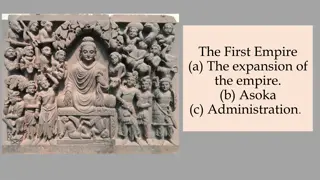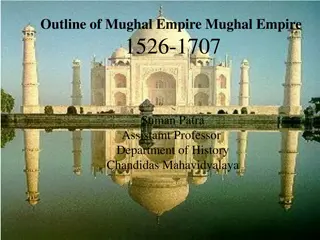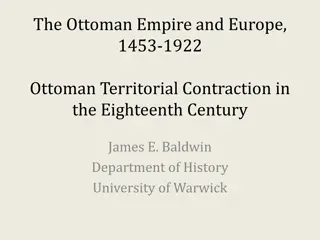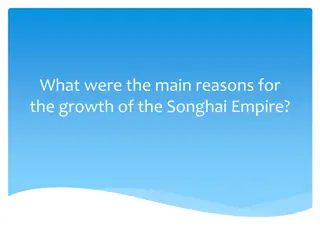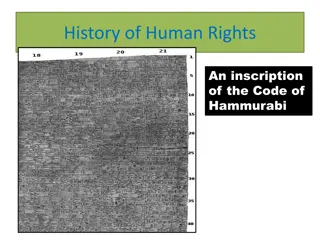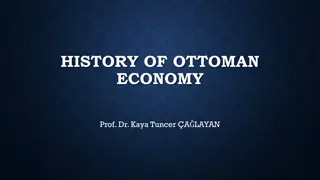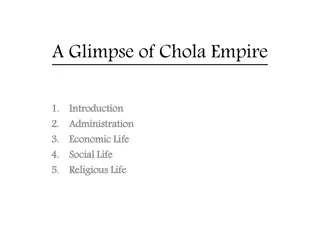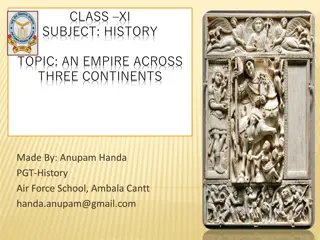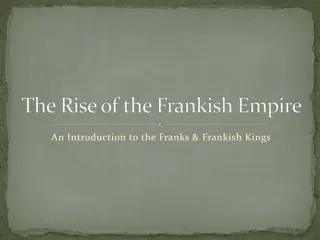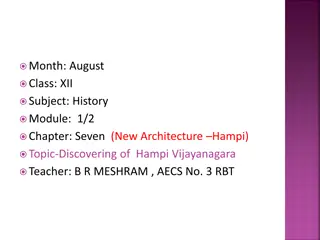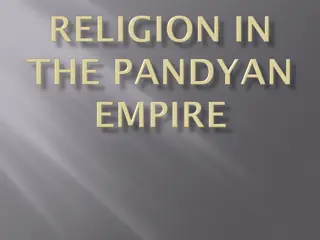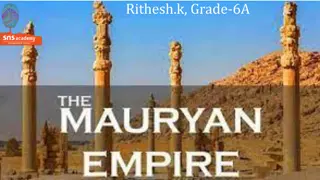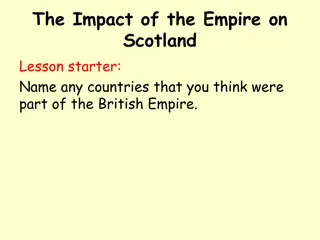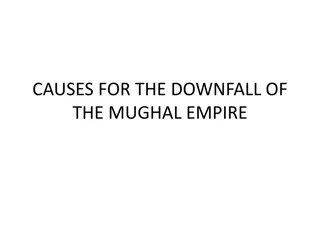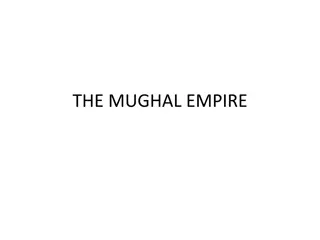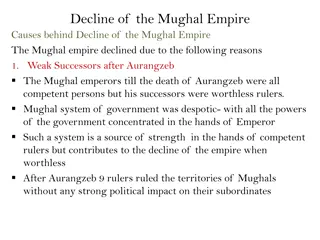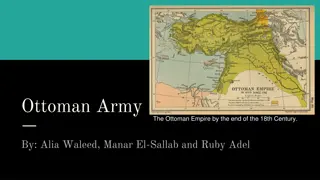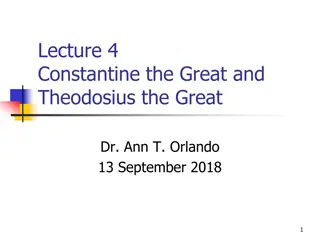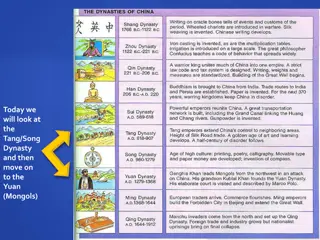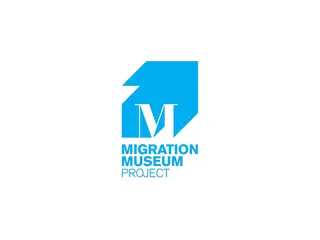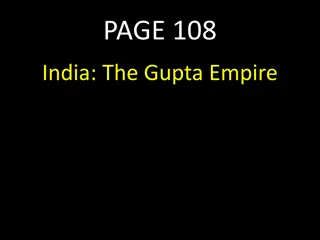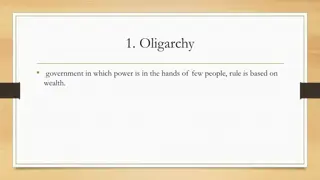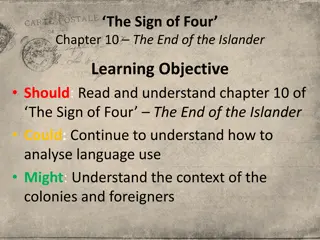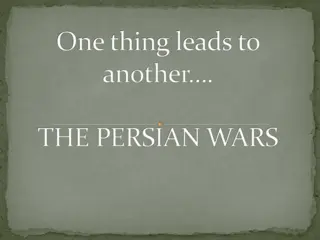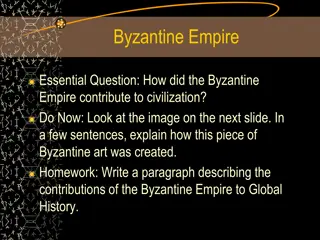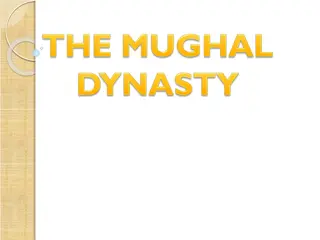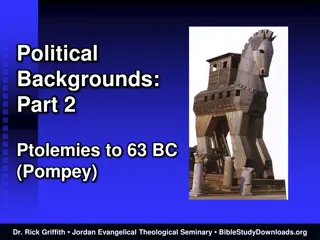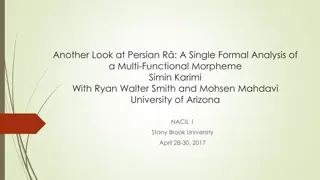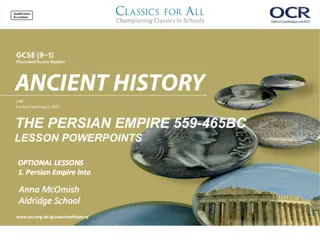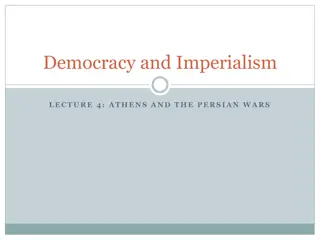Mauryan Empire: Expansion, Administration, and Legacy of Ashoka
The Mauryan Empire, ruled by Chandragupta, Bindusara, and the renowned Ashoka, witnessed significant expansion and innovative administration methods. Through taxation, infrastructure development, and royal appointments, the empire flourished. Ashoka's reign marked a shift towards peace, public welfa
4 views • 7 slides
Outline of Mughal Empire Mughal Empire 1526-1707.
The Mughal Empire in India from 1526 to 1707 was a significant period marked by notable rulers such as Babur, Humayun, Akbar, Jehangir, Shah Jehan, and Aurangzeb. These emperors each contributed differently to the empire's development, with highlights including military conquests, administrative ref
7 views • 14 slides
Ottoman Empire Territorial Contraction in the 18th Century
Ottoman Empire faced agricultural and fiscal crises in the 17th century, leading to internal rebellions. However, by the mid-17th century, the empire had recovered and experienced further expansion, albeit at a slower rate compared to the previous century. In the 18th century, the Ottomans suffered
2 views • 12 slides
Understanding the Growth of the Songhai Empire
Delve into the factors that fueled the growth of the Songhai Empire in West Africa for nearly 150 years. Explore the key reasons behind its rise to power and the significance of its dominance in the region. Work collaboratively to uncover evidence supporting the various factors that contributed to t
1 views • 6 slides
Writing an Evidence-Based Claim in History: Unraveling the Gupta Empire's Legacy
Delve into the art of crafting an evidence-based claim by exploring the historical context of the Gupta Empire. Understand the significance of formulating a well-supported thesis statement and backing it up with thorough evidence analysis, particularly focusing on the empire's achievements in mathem
0 views • 5 slides
Ancient Origins of Human Rights: Code of Hammurabi to Cyrus the Great
Explore the historical roots of human rights, starting from the Code of Hammurabi in Mesopotamia, through the reforms of Urukagina and the Neo-Sumerian Code of Ur-Nammu, to the groundbreaking principles established by Cyrus the Great in the Achaemenid Persian Empire. Witness the evolution of human r
0 views • 27 slides
Overview of the Ottoman Empire's Economy and Social Structure
The history of the Ottoman Empire's economy and social structure encompasses its Turkish and Islamic influences, as well as its geographical diversity across regions like Asiatic, East European, and African territories. The empire's centuries-long existence from 1300 to 1918 saw distinct periods of
3 views • 105 slides
A Glimpse of Chola Empire: Rise and Fall of an Ancient Dynasty
The Chola Empire, under rulers like Vijayalaya, Aditya I, and Rajaraja I, witnessed periods of expansion, conquests, and cultural advancements. Their efficient administration, economic prosperity, social structure, and religious practices are discussed, highlighting the empire's zenith under Arumoli
0 views • 11 slides
An Empire Across Three Continents - A Historical Journey
Explore the fascinating history of an empire spanning three continents, from the rise of trade networks in the Assyrian empire to Alexander the Great's conquests and the evolution of Rome into a dominant power. Discover the shared cultures, languages, and sources that illuminate the rich past of the
1 views • 34 slides
The Rise of the Frankish Empire: A Journey Through History
Explore the fascinating history of the Frankish Empire from the conquest of Gaul by the Franks in the 5th century to the reign of Charlemagne as the Holy Roman Emperor. Discover key events such as Clovis I's unification of the Franks, Charles Martel's victory at the Battle of Tours, and Charlemagne'
4 views • 6 slides
Overview of Persian Gulf Security and Historical Timeline
This content provides insights into the Persian Gulf security dynamics and a historical timeline of significant events in the region post World War I. It explores the geopolitical landscape, the role of key nations, and major milestones such as the Gulf War, U.S. military involvement, and diplomatic
2 views • 7 slides
Discovering the Rich History of Hampi: A Glimpse into the Vijayanagara Empire
Hampi, also known as Vijayanagara, holds the remnants of a once grand empire founded in the 14th century. The discovery of this historical site in 1800 by Colonel Colin Mackenzie marked the beginning of unveiling its treasures. From its origins under Harihara I and Bukka I to the golden era under Kr
0 views • 18 slides
Exploring the Significance of Persian Language and Literature in Indian History
Persian language and literature hold a crucial place in Indian history, serving as a prime source for understanding the medieval period. Scholars in India have dedicated their lives to preserving and promoting Persian history, language, and literature. The rich cultural heritage of India, dating bac
0 views • 9 slides
Hinduism Flourishing in the Pandyan Empire
Hinduism flourished during the period of the Pandyan Empire, with rulers giving extensive donations to Saiva and Vaishnava temples. They provided endowments for temple renovation and maintenance. Notable rulers like Maravarman Sundara Pandyan and Jatavarman Sundara Pandiya contributed significantly
0 views • 18 slides
Overview of Mauryan Empire: Chandragupta, Bindusara, and Ashoka
Mauryan Empire, established by the Mauryas, was the first major empire in India, encompassing a vast territory and surpassing previous dynasties in land control. Chandragupta Maurya, Bindusara, and Ashoka were key emperors who shaped the empire's history. Chandragupta, supported by Chanakya, conquer
0 views • 13 slides
The Impact of the British Empire on Scotland: Lessons and Reflections
Exploring the historical significance of the British Empire on Scotland, this lesson delves into the interconnections between the two entities. It examines various aspects such as population movements, cultural investments, economic influences, and the overall positive impact on Scotland. By investi
0 views • 12 slides
Causes for the Downfall of the Mughal Empire
The decline of the Mughal Empire post-Aurangzeb's reign was due to factors such as religious persecution, the Deccan policies, weak successors, financial difficulties, neglect of sea power, European settlement, and invasions. These political, social, and economic issues contributed to the downfall o
0 views • 9 slides
The Mughal Empire: History and Legacy
The Mughal Empire was founded by Babur, a skilled statesman and conqueror. His military conquests paved the way for the empire's expansion in India. Babur's son Humayun faced challenges during his reign, leading to a period of instability. Despite difficulties, the Mughal Empire left a lasting impac
0 views • 13 slides
Causes Behind the Decline of the Mughal Empire
The decline of the Mughal Empire was influenced by weak successors after Aurangzeb, degeneration of Mughal nobility, inefficiency of the army, economic bankruptcy, foreign invasions, wars of succession, and court factions. The empire faced challenges such as incompetent rulers, weakened military, fi
2 views • 5 slides
Life and Legacy of Jalal ad-Din al-Rumi: A 13th-Century Persian Poet and Sufi Mystic
Rumi, born in 1207 in present-day Afghanistan, was a renowned Persian poet, scholar, and Sufi mystic. His works, primarily in Persian, have transcended borders and ethnic divisions, captivating audiences across centuries. Rumi's spiritual journey, from scholarly pursuits to mystical encounters with
0 views • 15 slides
Rise and Fall of the Ottoman Empire's Military Power in the 18th Century
The Ottoman Empire's military success in the 18th century was attributed to their expertise in using gunpowder, loyal soldiers, strong organization, multilingual education, and strategic planning. However, the empire faced decline due to dated cultural practices and increasing European power, leadin
1 views • 17 slides
The Transformation of the Roman Empire: Constantine and Theodosius
The lecture delves into the significant reigns of Constantine the Great and Theodosius the Great in the context of the Roman Empire's historical changes. It explores the social and ecclesial impact brought about by Constantine's policies and examines the political landscape during the early fourth c
0 views • 29 slides
Rise and Legacy of the Mongol Empire
The rise of the Mongol Empire under Genghis Khan, the unification of Mongols, conquests, and the establishment of the Yuan Dynasty by Kublai Khan are highlighted. The Mongols' military prowess, organizational skills, and cultural adaptability led to the largest land empire in history. The Pax Mongol
0 views • 11 slides
Exploring Quantitative Meters in Persian Folk Songs and Poetry
Delve into the quantitative nature of meters in Persian folk songs and pop song lyrics as discussed by Mohsen Mahdavi Mazdeh at the University of Arizona. The study explores how syllable weight, vowel length, and metrical patterns play vital roles in classical Persian poetry and the poetry of spoken
0 views • 19 slides
Impact of British Empire and Commonwealth on Migration: Unpacking Immigration Stories
Explore the historical impact of the British Empire and Commonwealth on British migration through six immigration stories. Understand how relations with former colonies have shaped diversity in Britain and influenced British immigration patterns. Key terms like migration, emigration, empire, and col
0 views • 23 slides
Achievements of the Gupta Empire in India
The Gupta Empire in India flourished during its Golden Age, marked by peace, prosperity, and significant advancements in science, mathematics, astronomy, and medicine. Led by rulers like Chandra Gupta II, the empire fostered trade, innovation, and cultural exchange, influencing the spread of Indian
0 views • 9 slides
Key Historical Concepts and Contributions
Explore various historical concepts like oligarchy, Pax Romana, consulship, roles of patricians in Roman government, Hellenistic culture, mathematical contributions by Pythagoras and Euclid, origin of Zoroastrianism in the Persian Empire, major characteristics of the Roman Empire and Greece, geograp
0 views • 20 slides
An Overview of Ezra, Nehemiah, and the Persian Kings in 5777/2017 ELS
Explore the historical timeline of Ezra, Nehemiah, and the Persian Kings, covering events such as the destruction of the First Temple, the political struggles, the building of the Temple and walls in Jerusalem, and various challenges faced by the Jewish community during that period. Learn about the
0 views • 15 slides
Discovering Yazd: A Journey Through Persian Architecture and History
Yazd, a city with a history dating back over 5,000 years, is known for its unique mud-brick houses and Persian architecture. This ancient city in Iran boasts impressive wind catchers, a legacy of Zoroastrianism, and landmarks like the Amir Chaqmaq Complex. Explore Yazd's rich cultural heritage, clim
2 views • 17 slides
Colonial Influences and The British Empire
The British Empire once ruled over vast territories, including parts of North America, India, and Africa. European countries colonized other nations to expand trade and acquire resources. Colonization ceased in the 20th century due to moral objections and independence movements in colonies. The spre
0 views • 15 slides
The Persian Wars - One Thing Leads to Another
The Persian Wars were a series of conflicts triggered by events like the Ionian Revolt, leading to the Persian Empire seeking revenge on Athens. Starting with small fleets and culminating in the Battle of Marathon, the Greeks, though initially the underdogs, managed to repel the Persians. The Atheni
0 views • 15 slides
The Contributions of the Byzantine Empire to Civilization
The Byzantine Empire made significant contributions to civilization through art, law, religion, and centralization of government. The empire's legacy includes the preservation of Roman laws, promotion of Christianity, accumulation of church wealth, and establishment of Constantinople as a key center
0 views • 22 slides
Gulf History: Key Events and Developments in the Persian Gulf Region
Explore the rich history of the Persian Gulf region, from the post-WWI era to present-day tensions and agreements. Discover significant events such as the Gulf Wars, U.S. military involvement, Iran's nuclear activities, and recent diplomatic shifts. Understand the complex dynamics between nations in
0 views • 7 slides
Overview of the Mughal Empire and Its Great Mughals
The Mughal Empire was a significant imperial power in the Indian subcontinent from 1526 to 1757, ruled by Muslim descendants of Genghis Khan. The empire extended over a vast region and produced six great Mughal rulers: Babur, Humayun, Akbar, Jahangir, Shah Jahan, and Aurangzeb. Babur was the founder
0 views • 14 slides
Ancient Empires and Biblical History Timeline
Explore the political backgrounds from the Ptolemies to Pompey in 63 BC, including details on geographical locations in Acts and Epistles, the order of empires such as Greek, Babylonian, Assyrian, Roman, and Medo-Persian, developments during the Assyrian and Babylonian rules, Persian era returns, an
0 views • 38 slides
Analysis of Persian Morpheme -r in a Multifunctional Context
This analysis delves into the various functions of the Persian morpheme -r as a differential object marker, examining its presence on different types of objects and proposing a case system to explain its distribution. The study explores how -r marks specific DPs in Persian sentences and its implicat
0 views • 106 slides
Exploring the Ancient Persian Empire: Lessons and Tasks
Delve into the intriguing history of the Persian Empire with lessons focusing on its geography, rivals, and ruling dynamics. Engage in tasks such as chronological order puzzles, map analysis, and discussions on empire-building qualities. Uncover the complexities of the Middle East in 600 BC and the
0 views • 9 slides
The Byzantine Empire: Society, Achievements, and Decline
The Byzantine Empire, established in 527 A.C, was marked by religious conflicts and military advancements. The society was patriarchal, centered around Christianity, and had a hierarchical structure. The empire made significant progress in weaponry and trade, although frequent battles ensued. Despit
0 views • 7 slides
Byzantine Empire and Eastern Orthodox Church Overview
The Byzantine Empire, also known as the Eastern Roman Empire, flourished from 330 CE to 1453 CE under Greek rule. It played a significant role in trade, politics, and culture during the Post-Classical Era, connecting trade routes and reconquering the West under rulers like Justinian. However, challe
0 views • 9 slides
The Impact of Athens and the Persian Wars on Democracy and Imperialism
The lecture delves into the historical events surrounding Athens and the Persian Wars, highlighting key milestones such as the expulsion of Hippias with Spartan help, Cleisthenes' reforms, and the rise of Archaic Greek imperialism in Athens and Sparta. Herodotus' perspective on the Persian Wars and
0 views • 21 slides
